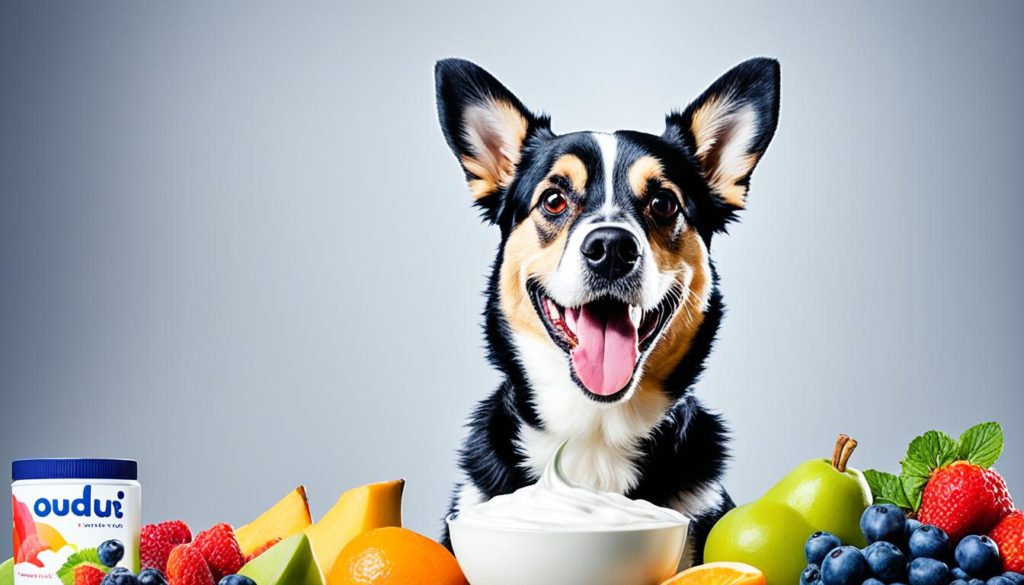If you’re considering adding yogurt to your dog’s diet, it’s important to know how much to give them and what kind of yogurt is safe for their consumption.
Yogurt can offer various health benefits for dogs, but it should be given in moderation and in the right proportions.
Here’s what you need to know about serving size, types of yogurt, and how to incorporate it into your dog’s routine.
Key Takeaways:
- Plain or non-fat plain yogurt without sweeteners or preservatives is the best kind for dogs.
- Yogurt should be no more than ten percent of your dog’s daily caloric intake.
- Choose yogurt without xylitol or added sugars to avoid potential health issues.
- Yogurt provides calcium, protein, and probiotics that can benefit your dog’s overall health.
- Consult with your veterinarian for personalized recommendations on feeding yogurt to your dog.
The Benefits of Yogurt for Dogs
Yogurt provides several benefits for dogs. It is a good source of calcium, protein, and probiotics.
The calcium in yogurt supports the health of bones and tissues, promoting strong teeth and a well-functioning skeletal system.
“Calcium is essential for the growth and maintenance of healthy bones in dogs. Incorporating yogurt into your dog’s diet can contribute to their overall bone health.”
The protein content in yogurt is vital for muscle growth and repair. It helps dogs maintain lean muscle mass and aids in the recovery process after physical activity or injury.
In addition, yogurt contains beneficial probiotics that foster a healthy gut microbiome and aid in digestion. Probiotics help maintain the balance of good bacteria in the digestive tract, which can improve overall gastrointestinal health in dogs.
“Probiotics play a crucial role in supporting your dog’s digestive system. They can help alleviate digestive issues and promote a healthy gut environment.”
Furthermore, probiotics can help dogs fight yeast infections by regulating the yeast population in their bodies. They also strengthen the immune system and enhance dogs’ ability to ward off harmful pathogens and infections.
Incorporating yogurt into your dog’s diet can provide these essential nutrients and promote their overall well-being.
A Healthy Choice for Your Furry Friend
Choosing yogurt as a treat or supplement for your dog can offer a range of health benefits. The calcium, protein, and probiotics found in yogurt support your dog’s musculoskeletal system, aid in muscle growth and repair, and promote digestive health.
Additionally, the probiotics in yogurt strengthen your dog’s immune system and assist in the fight against yeast infections. Remember to use plain or non-fat plain yogurt without sweeteners or preservatives. Prioritize your dog’s health with this nutritious and delicious option!
Choosing the Right Yogurt for Your Dog
When it comes to giving yogurt to your furry friend, it’s crucial to choose the best kind that will provide maximum health benefits. The ideal yogurt for dogs is plain or non-fat plain yogurt without any sweeteners or preservatives. These versions contain fewer additives that can be harmful to your pup’s digestive system. It’s always a good idea to read the ingredients carefully to ensure that the yogurt does not contain xylitol or added sugars, as these can be toxic to dogs.
Flavored yogurts and those with fruit or mix-ins may seem appealing, but they can be detrimental to your dog’s health. These varieties often contain extra additives, artificial flavors, and added sugars that can upset your dog’s stomach or lead to weight gain. It’s best to stick to plain options free from additional ingredients.
Greek yogurt is an excellent choice for dogs as it is thicker and contains lower levels of lactose. This makes it easier for dogs to digest while still providing the health benefits of yogurt. Greek yogurt generally has a higher protein content, making it a great option for muscle growth and repair in your furry companion. However, it is important to note that even though Greek yogurt contains less lactose, some dogs may still experience sensitivity, so it is essential to monitor their tolerance.
In addition to plain and Greek yogurt, there are other suitable options for dogs. Low-fat yogurt, naturally flavored yogurt, and even frozen yogurt can be given as occasional treats to your furry friend. Just make sure to opt for products without any harmful additives or excessive sugar content.
Remember, the key is to provide your dog with the healthiest and most natural yogurt option possible. By choosing the right kind of yogurt, you can ensure that your pup enjoys a delicious and nutritious snack without any potential harm to their well-being.
Determining the Right Serving Size of Yogurt
The right serving size of yogurt for dogs depends on several factors including the dog’s size, weight, daily calorie intake, underlying health issues, activity level, and neuter status. It’s crucial to consider these factors to ensure your furry friend receives an appropriate amount of yogurt for their needs.
As a general guideline, yogurt should not make up more than ten percent of a dog’s daily caloric intake. This percentage allows for a balanced diet while providing the benefits of yogurt.
For an average-sized dog, one tablespoon is considered an appropriate serving size of yogurt. This amount is enough to incorporate yogurt into their diet without overwhelming their daily calorie intake. Smaller dogs may have one spoonful, while larger dogs may have up to three spoonfuls of yogurt.
Remember to monitor your dog’s overall diet and adjust the serving size accordingly. If you have any concerns about the appropriate serving size for your dog, consult your veterinarian for personalized recommendations.

Yogurt Serving Size Guidelines
| Dog Size | Yogurt Serving Size |
|---|---|
| Small | 1 spoonful |
| Average | 1 tablespoon |
| Large | Up to 3 tablespoons |
Feeding Yogurt to Your Dog
When it comes to incorporating yogurt into your dog’s diet, there are several options to consider. Whether you want to mix it with their regular food, use it as an ingredient in homemade dog treats, or create yogurt-based frozen treats, there’s a way to introduce yogurt that your dog will love.
It’s important to be mindful of the calorie and fat content of the yogurt you choose. Checking the label ensures you are making a healthy choice for your pet. Avoid overfeeding yogurt to prevent weight gain, as excessive calories can lead to health issues in dogs.
Please note: If you are following the 10% treats rule, giving yogurt alone may not provide enough probiotic benefits for your dog. In such cases, it’s recommended to consult your veterinarian for a probiotic supplement recommendation to ensure your dog’s digestive health is well supported.
Take a look at the table below for a quick overview of the different ways you can feed yogurt to your furry friend:
| Feeding Method | Description |
|---|---|
| Mixing with regular food | Introduce a spoonful of yogurt to your dog’s regular meal to enhance its taste and provide added nutrients. |
| Homemade dog treats | Use yogurt as an ingredient in homemade dog treats. Check out dog-friendly recipes that incorporate yogurt for a delicious and nutritious reward. |
| Yogurt-based frozen treats | Freeze yogurt in molds or ice cube trays to create refreshing frozen treats for your dog to enjoy on a hot day. |
Remember, moderation is key when feeding yogurt to your dog. It should be seen as a special treat or occasional addition to their diet rather than a staple food. By following these guidelines and consulting with your veterinarian, you can safely and enjoyably incorporate homemade yogurt for dogs into your pet’s meal routine.

Conclusion
Yogurt can be a healthy treat for dogs, providing them with a boost of nutrients and delicious flavor. When choosing yogurt for your furry friend, opt for plain or non-fat plain yogurt without any sweeteners or preservatives. This ensures that your dog is getting the maximum benefits without any harmful additives.
Yogurt is a great source of calcium, protein, and probiotics, which are all crucial for your dog’s overall health. Calcium supports strong bones and tissues, while protein aids in muscle growth and repair. The probiotics in yogurt promote a healthy gut microbiome and aid in digestion, giving your dog a well-balanced diet.
However, it’s important to monitor your dog’s tolerance to lactose, as some dogs may have difficulty digesting it. Start with small servings of yogurt and observe if your dog experiences any digestive issues. Adjust their serving size accordingly to ensure their comfort and well-being.
To get personalized recommendations on feeding yogurt to your furry companion, consult with your veterinarian. They can provide guidance on the ideal serving size and frequency based on your dog’s specific needs. Remember, moderation is key when it comes to yogurt treats for dogs, so providing it as an occasional treat will help keep your pup happy and healthy.
FAQ
How much yogurt should I give my dog?
Dogs should have yogurt in moderation. As a general guideline, yogurt should not make up more than ten percent of a dog’s daily caloric intake. For an average-sized dog, one tablespoon is considered an appropriate serving size. Smaller dogs may have one spoonful, while larger dogs may have up to three spoonfuls.
What are the benefits of yogurt for dogs?
Yogurt provides several benefits for dogs. It is a good source of calcium, protein, and probiotics. The calcium in yogurt supports the health of bones and tissues, while the probiotics promote a healthy gut microbiome and aid in digestion. The protein content in yogurt is essential for muscle growth and repair. Probiotics can also help dogs fight yeast infections and boost their immune system.
What is the best kind of yogurt for dogs?
The best kind of yogurt for dogs is plain or non-fat plain yogurt without any sweeteners or preservatives. Flavored yogurts and those with fruit or mix-ins should be avoided. Greek yogurt is a good option for dogs, as it is thicker and contains lower levels of lactose. Other yogurt options for dogs include low-fat, naturally flavored, and frozen varieties.
How do I determine the right serving size of yogurt for my dog?
The right serving size of yogurt for dogs depends on several factors including the dog’s size, weight, daily calorie intake, underlying health issues, activity level, and neuter status. It is important to monitor your dog’s tolerance to lactose and adjust the serving size accordingly. Consult with your veterinarian for personalized recommendations on feeding yogurt to your dog.
How can I incorporate yogurt into my dog’s diet?
There are different ways to incorporate yogurt into your dog’s diet. You can mix it with their regular food, add it to homemade dog treats, or freeze it to make yogurt-based treats. When feeding yogurt, it’s important to check the calorie and fat content on the label and avoid overfeeding. If you are following the 10% treats rule, yogurt alone may not provide enough probiotic benefits, so consult your veterinarian for a probiotic supplement recommendation.
Can dogs have yogurt as a treat?
Yes, yogurt can be a healthy treat for dogs when given in moderation and the right kind. Plain or non-fat plain yogurt without sweeteners or preservatives is the best choice. It provides calcium, protein, and probiotics that support your dog’s overall health. It’s important to monitor your dog’s tolerance to lactose and adjust the serving size accordingly. Consult with your veterinarian for personalized recommendations on feeding yogurt to your dog.

